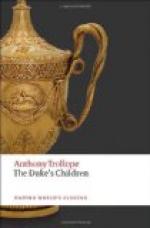’Pray write me at once, and tell me when I shall see you.
’Your affectionate Cousin,
‘F. O. Tregear.’
In answer to this there came a note in a very few words. She congratulated him,—not very warmly,—but expressed a hope that she might see him soon. But she told him not to come to Brighton. The Earl was better but very cross, and she would be up in town before long.
Towards the end of the month it became suddenly known in London that Lord Grex had died at Brighton. There was a Garter to be given away, and everybody was filled with regret that such an ornament to the Peerage should have departed from them. The conservative papers remembered how excellent a politician he had been in his younger days, and the world was informed that the family of Grex of Grex was about the oldest in Great Britain of which authentic records were in existence. Then there came another note from Lady Mabel to Tregear.
’I shall be in town on the thirty-first in the old house, with Miss Cassewary, and will see you if can come down on the first. Come early, at eleven, if you can.’
On the day named and at the hour fixed he was in Belgrave Square. He had known this house since he was a boy, and could well remember how, when he first entered it, he had thought with some awe of the grandeur of the Earl. The Earl had then not paid much attention to him, but he had become very much taken with the grace and good nature of the girl who had owned him as a cousin. ’You are my cousin, Frank,’ she had said; ’I am so glad to have a cousin.’ He could remember the words now as though they had been spoken only yesterday. Then there had quickly grown to be friendship between him and this, as he thought, sweetest of all girls. At that time he had just gone to Eton; but before he left Eton they had sworn to love each other. And so it had been and the thing had grown, till at last, just when he had taken his degree two matters had been settled between them; the first was that each loved the other irretrievably, irrevocably, passionately; the second, that it was altogether out of the question that they should ever marry each other.
It is but fair to Tregear to say that this last decision originated with the lady. He had told her that he certainly would hold himself engaged to marry her at some future time; but she had thrown this aside at once. How was it possible, she said, that two such beings, brought up in luxury, and taught to enjoy all the good things of the world, should expect to live and be happy together without an income? He offered to go to the bar;—but she asked him whether he thought it well that such a one as she should wait say a dozen years for such a process. ’When the time comes, I should be an old woman and you would be a wretched man.’ She released him,—declared her own purpose of marrying well; and then, though there had been a moment in which her own assurance of her own love had been passionate enough, she went so far as to tell him that she was heartwhole. ’We have been two foolish children but we cannot be children any longer,’ she said. ’There must be an end of it.’




